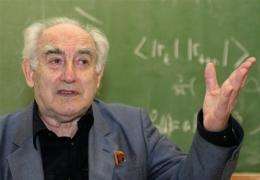Russian bomb physicist Ginzburg dead at 93

Nobel Physics prize winner Vitaly Ginzburg, who helped develop the Soviet hydrogen bomb, has died at age 93, the Russian Academy of Sciences said Monday.
Ginzburg said the bomb "saved" his life during an anti-Jewish campaign. But he had drawn controversy in recent years with fierce public criticism of the Russian Orthodox Church, which has enjoyed surging popularity and political influence since the fall of the atheist Communist regime.
"He died from heart failure," Irina Presnyakova, a spokeswoman for the Russian Academy of Sciences, told AFP. News agencies reported that Ginzburg died late Sunday after long suffering from ill health.
President Dmitry Medvedev and Prime Minister Vladimir Putin offered their condolences to Ginzburg's family.
"We bid farewell to an extraordinary personality whose outstanding talent, exceptional strength of character and firmness of convictions evoked true respect from his colleagues," Putin said in a statement.
Born into an educated Jewish family in Moscow in 1916, just before the Bolshevik Revolution, Ginzburg helped develop the Soviet Union's hydrogen bomb in the late 1940s and early 1950s.
He worked on the project with Andrei Sakharov, who later became a prominent anti-Communist dissident, and stayed friends with him even after Sakharov was officially condemned and sent into internal exile in 1980.
Alhough Ginzburg joined the Communist Party in 1942, he came under pressure from the totalitarian regime of Joseph Stalin amid an anti-Semitic state campaign against perceived Western influences in science.
But the importance of the bomb project -- which was aimed at preventing the Soviet Union from falling behind the United States in the atomic arms race -- kept Ginzburg out of prison.
"I was saved by the hydrogen bomb," Ginzburg wrote in his autobiography on the website of the Nobel Prize Committee.
A theoretician whose interests ranged from black holes and cosmic rays to low-temperature physics, Ginzburg wrote more than 400 scientific papers, won numerous honours and lectured well into his eighties.
In 2003, he shared the Nobel Physics Prize with US physicists Alexei Abrikosov and Anthony Leggett for their contributions to the theory of superconductors and superfluids.
Superconductors let electric current pass without resistance and without dissipating energy as heat. Researchers hope to use them in ultra-fast computers and magnetic trains, among other applications.
After the 1991 collapse of the Soviet Union, Ginzburg acquired another claim to fame -- as one of Russia's leading critics of religion.
An avowed atheist, he criticised the growing influence of the Russian Orthodox Church even as many of his countrymen were turning to the church after the downfall of official Soviet atheism.
In 2007, he was one of 10 prominent scholars who signed an open letter to then-president Putin denouncing the "clericalization" of Russian society and criticising efforts to teach Orthodox Christianity in state schools.
The letter provoked angry complaints from Orthodox groups.
"Faith is the free choice and right of every person. But I am against the propagation of religion in schools," Ginzburg said in a 2006 interview with official government newspaper Rossiiskaya Gazeta.
"In general, I envy believers. I am 90 and being overcome by illnesses. For believers it is easier to deal with them and with life's other hardships. But what can be done? I cannot believe in resurrection after death."
(c) 2009 AFP
















